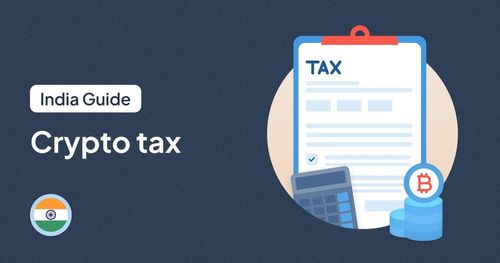
Are you a crypto investor in India? Thinking about selling a portion of your holdings? Whether you're just entering the digital asset realm or are an experienced investor pivoting to new opportunities, it’s important to understand how crypto is taxed in India.
An improper understanding of crypto tax rules could land you in a tricky position with the Income Tax Department and result in unexpected liabilities. As India formalizes its stance on digital assets, the scrutiny from tax authorities is only increasing.
In this article, we’ll cover the fundamentals of crypto tax rules in India — from key tax triggers to penalties for non-compliance, along with examples and clarity on recent updates.
Table of contents |
No credit card required
How Does India Tax Crypto?
India began taxing crypto following the Union Budget 2022, when Finance Minister Nirmala Sitharaman introduced formal recognition of Virtual Digital Assets (VDAs), including crypto and NFTs.
Here are the key highlights of India's crypto tax framework:
• A flat 30% tax on profits from selling, swapping, or spending VDAs, as per per Section 115BBH.of the Income Tax Act.
• No deductions are allowed, except for the cost of acquisition. Expenses such as brokerage fees, internet bills, or mining costs are not deductible.
• A 1% TDS (Tax Deducted at Source) is applicable on all crypto transactions, deducted on the gross sale amount — not on the net profit.
This 1% TDS applies even if a transaction incurs a loss. To better understand this, you can refer to the CBDT’s Circular on Crypto Taxation, which offers official clarification on how these rules apply.
This approach places India among the countries with the most stringent taxation policies on crypto — focused more on tracking and compliance than incentivizing adoption.
Crypto Tax Triggers
In India, taxes are triggered in multiple ways when dealing with cryptocurrencies. Here are the three main scenarios:
1. Selling Crypto for Fiat Currency
Selling crypto for INR (Indian Rupees) or any other fiat currency is a taxable event. You’ll be taxed 30% on the net profit, irrespective of how long you held the asset.
Example:
If you bought Bitcoin for ₹1,00,000 and sold it for ₹1,50,000, you’d owe ₹15,000 in tax (30% of ₹50,000 profit).
2. Trading One Crypto for Another
Swapping one crypto token for another — for instance, trading Bitcoin (BTC) for Ethereum (ETH) or USDT — also qualifies as a taxable event.
This includes peer-to-peer and decentralized exchanges (DEXs). Even though you don’t receive INR directly, the transaction is considered a sale, and capital gains apply on the profit component.
3. Spending Crypto
If you use crypto to purchase goods or services, such as paying for coffee, software subscriptions, or freelance work, that’s also a taxable event. You are liable to pay 30% tax on any gain made on the crypto since you acquired it.
Even everyday transactions — like paying your Netflix subscription with USDT — are considered taxable sales of crypto under Indian tax laws.
| Note: Wallet-to-wallet transfers (say, moving funds from WazirX to CoinDCX) are not taxable since there is no sale or consideration involved. This makes them safe from both income tax and TDS, provided ownership remains with you. |
Loss Harvesting Restrictions
One of the most debated aspects of India’s crypto tax law is its ban on loss offsets.
As per Section 115BBH(2)(b)
• Losses from one VDA (Virtual Digital Asset) transaction cannot be set off against gains from another.
• You also cannot carry forward crypto losses to future financial years.
This effectively nullifies strategies like tax loss harvesting that are common in jurisdictions like the US and UK.
Example:
• Trade 1: Gain = ₹25,000
• Trade 2: Loss = ₹10,000
• Taxable amount = ₹25,000 (You still pay ₹7,500 tax)
• The ₹10,000 loss is ignored for tax purposes.
Even worse, 1% TDS still applies on each transaction's gross sale value, regardless of whether it’s profitable or not. Over time, this can eat into capital — especially for high-frequency traders or arbitrageurs.
Crypto Tax Case studies
Let’s break down a realistic example to illustrate how crypto taxation works in India.
Case 1: Profitable Trade
• You bought crypto worth ₹1,00,000.
• After two years, you sold it for ₹2,50,000.
• Exchange charged ₹5,000 as trading fees.
Step 1: TDS Deduction
TDS = 1% of ₹2,50,000 = ₹2,500 (deducted immediately by the exchange)
Step 2: Tax on Profit
• Profit = ₹2,50,000 – ₹1,00,000 = ₹1,50,000
• Tax = 30% of ₹1,50,000 = ₹45,000
| Note: Note: You cannot deduct the ₹5,000 fee while calculating gains. That means your effective tax rate is even higher than 30%. |
Case 2: Loss-making Trade
• You bought crypto for ₹2,50,000.
• Later, you sold it for ₹1,00,000.
• Incurred a loss of ₹1,50,000.
Tax implication?
• No 30% tax applies (as there is no profit).
• But 1% TDS of ₹1,000 still applies.
• The loss cannot be carried forward, nor can it offset profits from other assets like stocks or mutual funds.
This one-way system of taxing only gains (but ignoring losses) is highly unfavourable for traders, and many have voiced concerns about its sustainability in the long term.
What are the Penalties for Inaccurate Crypto Reporting?
India’s tax regime takes non-compliance very seriously — especially for digital assets.
Here’s what could happen if you're not careful:
Under-reporting or Non-reporting Crypto Gains
• If you under-report your crypto gains, you can face a penalty of 50% to 200% of the tax amount evaded.
• In cases of willful misreporting, the punishment can extend to imprisonment up to 7 years, under provisions of the Income Tax Act.
Late Filing of ITR
• You’ll owe 1% interest per month on unpaid taxes.
• A late fee of: (under Section 234F)
o ₹1,000 (if income is below ₹5 lakhs),
o ₹5,000 (if income is above ₹5 lakhs),
TDS Non-compliance
If you’re a business or individual liable to deduct TDS (such as exchanges or crypto service providers), failing to deduct or pay TDS on time invites:
• Interest on late payment
• Penalty equal to TDS amount
• ₹200 per day for failing to file TDS returns.
Even freelancers or consultants receiving crypto as payment must ensure fair market value in INR is calculated and reported as income under “Other Sources” or Business Income, depending on the context.
Summary
India's crypto tax regime is one of the most rigid globally, with little room for deductions or strategic planning. While it's a positive step that digital assets now have official recognition, the harsh rules can be discouraging for retail investors and traders.
Here’s a quick recap:
- Flat 30% tax on profits from selling/swapping/spending crypto
- 1% TDS on gross sale value — even during losses
- No loss offset or carry-forward
- Severe penalties for non-compliance, misreporting, or failing to deduct TDS
- Crypto received for services is treated as income and must be disclosed in your ITR
As India continues to shape its stance on Web3 and digital assets, keeping up with the latest tax guidelines and filing requirements is crucial. For peace of mind, consider consulting a qualified tax advisor with experience in VDAs or using crypto tax software like “cryptact” that integrates with Indian exchanges.
No credit card required


